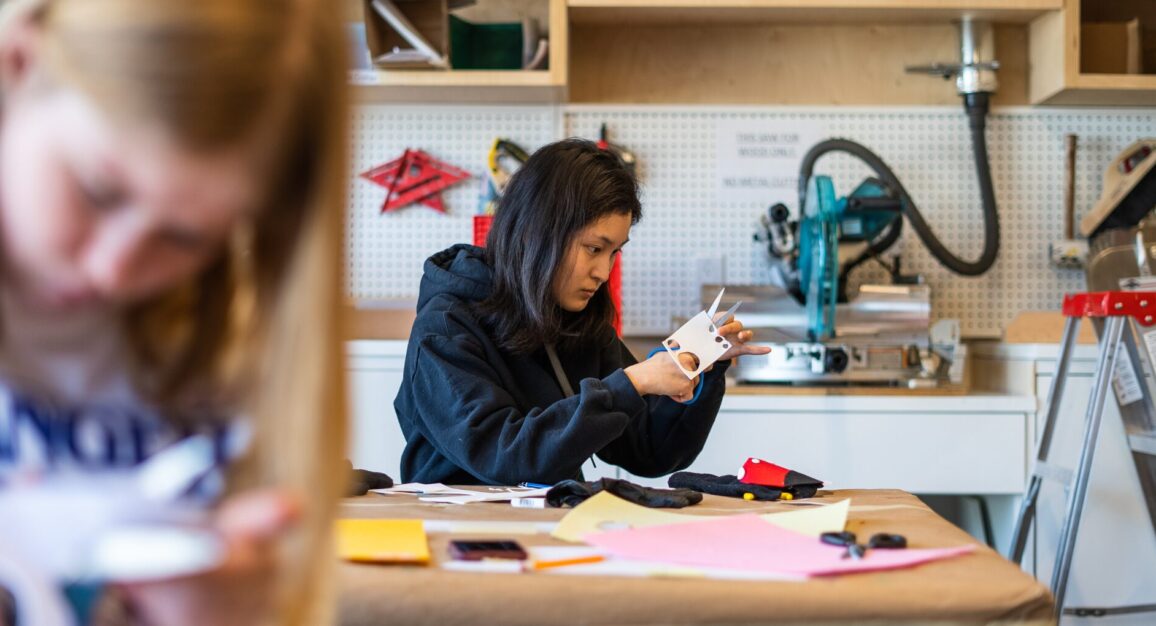Programs Pro-D Day Stagecraft Workshops
Pro-D Day Stagecraft Workshops

Stay tuned for 2025/26 Stagecraft programs!
Past Workshops:
Sound Design
Date: April 28, 2025
Hours: 9am-4pm
Instructor: Matthew Piton
Ages: 13-19 years
Without a sound designer to create the perfect soundscape, the theatre, film, television and game industries are incomplete. In this day-long workshop, while applying the technical and creative aspects of sound, you will explore being an audio storyteller. Students will learn how to source and modify existing sound effects, how to create sound from scratch by capturing real-world sounds as well as Foley creation. Students will learn about sound design techniques, hardware and the software used in theatrical sound design. They will create their own theatrical production audio playback file, which controls the volume, fade in and out of their individual sound files. A final project will include building a soundscape to tell a simple story of the students’ invention.
Each student will be provided with a Mac computer workstation for the day, and the necessary software, QLab and Audacity.
Set Design
Date: Friday, February 14, 2025
Hours: 9am-4pm
Instructor: Monica Emme
Ages: 13-19 years
A set designer works in the fields of theatre, film, and television, and is responsible for creating the visual world of a production. They work closely with the director and other members of the creative team in a highly collaborative process to imagine, design, and communicate the physical environment in which the action of the production takes place. This can include everything from set pieces and backdrops to props and special effects. Set designers use their skills and creativity in art, design, and architecture to create immersive and convincing environments that help to tell the story and transport the audience to another world. They may work on a variety of productions, from small-scale plays to large-scale films or operas, and are an essential part of the creative process in the entertainment industry.
Costume Design
Instructor: Alaia Hamer
Ages: 13-19 years
From Indiana Jones’ wide-brimmed fedora to Dorothy’s ruby slippers, costumes can be as identifiable with a character as the actor who played the part.
A costume designer is the person responsible for designing the clothing elements worn by actors in a film or stage production. They possess a similar skill set to that of traditional fashion designers but must also satisfy the unique demands of designing clothes for theatre or film: theatrical costumes must adhere to the specific requirements of the narrative while also being durable enough to withstand repeated wear and quick changes between scenes. The costume designer serves the directorial vision of the production and also works in concert with other designers in mediums like lighting and scenic design to create a cohesive aesthetic for the production as a whole. Part of the excitement and draw of costume design is the opportunity to create a diverse array of costumes and explore unique narratives and characters with each new project.
Stage Management
Instructor: Jackie Adamthwaite
Ages: 13-19 years
Stage managers may be the glue that actually holds theatrical production together. From before the first day of rehearsal to tech, and through to the closing night, the best stage managers bring an alchemical blend of organizational skill, creativity, caring, composure and focus to their work. Directors, actors, designers and stage crew alike all rely on a stage manager to help bring a wide-ranging variety of interests into focus, resulting in the harmonious convergence of performance, tech, design and management.
Lighting Design
Instructor: Alan Brodie
Ages: 13-19 years
The Lighting Designer works with all members of the production team, particularly the Director, other Designers and Lighting Technicians. They conceptualize and design the look and feel of the lighting and play a crucial role in supporting the storytelling visually. School subjects that intersect with the role of the lighting designer include Drama and Theatre Studies, Art and Design, Electronics, Physics, Photography, Media Studies and Music. Lighting Design for the stage is a discipline that straddles technical know-how and creativity, and may be the ideal field for the student who loves the theatre but isn’t sure they want to be a performer. Imagination lies at the heart of lighting, and the lighting designer stands to contribute greatly to both the visual and the emotional impact of the production. Attributes that lend themselves to success as a lighting designer include technical knowledge and practical programming skills, the ability to work under pressure to tight deadlines, excellent communication skills, creativity, theatre knowledge and musicality.
Register Now!
Email us at registration@artsumbrella.com or call the Student Services team during business hours at:
604-681-5268 | Granville Island
604-497-0308 | Surrey
Support Arts Umbrella
Arts Umbrella donors, volunteers, and sponsors share the same belief: that arts education can transform a child’s life. Whether attending an event, making a monthly gift, or donating time, our supporters are vital to helping us inspire creativity for good through the arts.